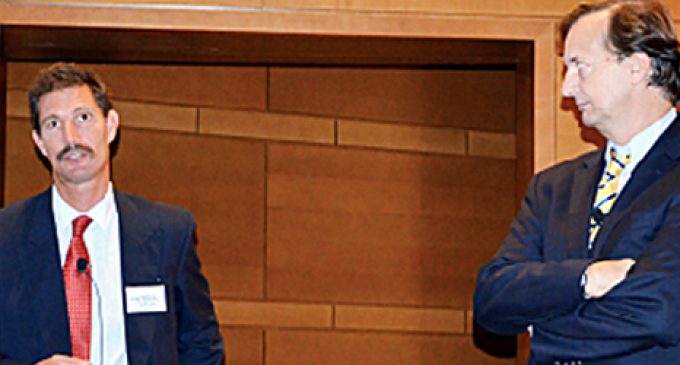‘White African’ discusses fight against Mugabe

A British-born white Zimbabwean who is waging a human rights and legal battle against one of Africa’s longest-serving leaders told his story at Wake Forest University Tuesday.
Ben Freeth says he, his family and friends have been subjected to unspeakable acts of torture and even death after standing up against Zimbabwe President Robert Mugabe’s controversial 2001 land reform measure, which stripped white Zimbabweans of their land and property.
“We had this situation where there was nothing that was sacred any longer,” Freeth told the audience in the newly constructed Farrell Hall. “…We realized that somehow, we needed to use whatever influences that we could to do whatever we could to stop what was happening, to make an impact.”

The late Mike Campbell and Ben Freeth pose with black Zimbabweans in this PR pic for “Mugabe and the White African.”
Freeth decided to fight back by using every means available to him to object to Mugabe’s leadership. He and his late father-in-law, Mike Campbell, filed suit against the Zimbabwean government and President Robert Mugabe. The lawsuit gained international attention and resulted in the abduction and torture of Freeth and his in-laws in 2008. The family’s struggle is depicted in the documentary “Mugabe and the White African,” which WFU screened in the Z. Smith Reynolds Library Auditorium on Sept. 10, and a book of the same name. Campbell died three years later, as a result of the injuries he sustained during that time, prompting Freeth to found the Mike Campbell Foundation (MCF).
“We, as the Mike Campbell Foundation, stand for justice, we stand for human rights,” Freeth declared. “We stand for the rule of law. We stand for property rights to be restored, not only to those who have lost them, but to those who have never had them.”
Like many African nations that won independence from their European colonizers, Zimbabwe, which broke free from British rule in 1980 after more than 70 years under England’s rule, had a wealthy white upper class and a black poor and working class. Mugabe said the land reform program would balance the long-tilted playing field by finally giving blacks land of their own and the wealth that comes with it. But Dr. Craig Richardson, an associate professor of economics at Winston-Salem State University who joined Freeth for his address, said the land-grab only served Mugabe.
“The idea was to take these huge farms and redistribute them to tens of thousands of landless blacks,” Richardson said, noting that the government later opted to retain ownership of the land itself. “…For the first time in its history, it ignored property rights, when in fact property rights had been enshrined in its own constitution.”
Mugabe, one of the world’s most controversial leaders, blames his country’s decline on drought, but Richardson, who has studied Zimbabwe’s economy for nearly a decade, said the southern African nation’s economic woes are directly linked to the land reform program, which stripped over 90 percent of white landowners of their property. Many of these landowners ran profitable farms that employed blacks and pumped money into the government’s coffers. In the 1990s, the Freeths and the Campbells ran the country’s most profitable mango-growing operation.
Mugabe’s land reform plan was not popular with black or white Zimbabweans. Only eight percent voted for it, but Mugabe pushed through the plan anyway.
Once hailed as “The Breadbasket of Africa,” Zimbabwe was among the fastest growing economies worldwide, with a 92 percent literacy rate, low crime and a strong health and social infrastructure to support its people, Freeth said.
“We were a great shining light, I believe, to those countries around us,” Freeth stated, “…and then 2000 came and we had invasions, the land seizures.”
In addition to mangos, Freeth and his kin grew other fruit and golden leaf tobacco that often found its way into American cigarettes. The farm, which at its height employed around 500 workers, was also a wildlife preserve, where sables and giraffes roamed freely. Then the Zimbabwean government began to move in, first burning valuable resources such as hay without provocation, and later killing wildlife, poisoning crops and burning hundreds of thousands of homes to the ground.
“You feel so incredibly helpless when something like that happens,” Freeth said. “Your property is destroyed before your eyes and there is nothing you can do – they had carte blanche to do whatever they wanted … hundreds of thousands of dollars could be destroyed with no accountability whatsoever.”
Freeth believes Mugabe’s reason for seizing the land a wreaking havoc on the economy was simple – to create a populace that was easy to control.
[pullquote]“Dictators, if they want to control the people, they have to make them poor, they have to make them hungry, they have to make them totally dependent on them for existence,”[/pullquote] he stated. “It was to make everyone dependent – no longer independent – and total control was achieved as a result.”
Through the foundation, Freeth continues to fight for property rights and basic human rights in Zimbabwe. Despite the setbacks he has seen, Freeth remains confident that it will someday reclaim its rightful place at the helm of Africa’s upward economic momentum.
“You will see in time to come, Zimbabwe rising … to be one that breaks all records,” he said, “to be one where we are, once again, the Breadbasket of Africa.”
Freeth’s WFU talk was part of a campus tour that included stops at five universities in North Carolina.











